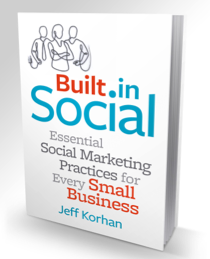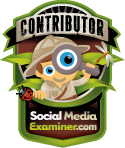
The newly launched Facebook hashtags could prove to be the savior of Graph Search – the recently launched Facebook search feature.
Graph Search does what it promises – returning search results based on the social graphs of your Facebook friends, fans, and followers. This means that you tend to see search results only for those friends and businesses with whom you are already closely aligned.
If you happen to be using Facebook for outreach and marketing, the new hashtag feature will extend your reach dramatically. This will create both risks and rewards, so you will want to choose your hashtags with care.
#1 – Avoid Desperation Marketing
What I am already noticing are Facebook posts that include a rash of hashtags. As expected, the inevitable hashtag spam has just begun. We have not seen this with Twitter hashtags because the 140 character limitation keeps it in check.

One example of Facebook hashtag spam
This is just one more example of desperation marketing. We are already familiar with this in its many forms. These include:
- Sensationalized headlines
- All caps and excessive use of exclamation points
- Controversy and false claims
Now add a truckload of hashtags to that and you have a real mess that is sure to annoy those that you presumably most want to engage and inspire to action.
Smart businesses know that desperation marketing only serves to repel potential buyers.
When you use dozens of hashtags you tell the Facebook search engine that your post has no focus. So, all you are really doing is spamming your friends and fans.
Don’t do it.
#2 – Hashtags Are Keyword Tags – Use Them Well
Given that the effectiveness of Facebook search is marginal at best, hashtags can be quite useful for tracking your content. However, this isn’t going to work if you are using broad keyword phrases – such as #smallbusiness.
A broad keyword tag or hashtag is the same as none at all. As we all know, saying “one size fits all” means it doesn’t fit anyone well.
Use a hashtag that is personal to you, such as your business name. One that I’ve been using lately is #builtinsocial, which happens to be the title of my new book.
When I search for the hashtag #builtinsocial I’m confident the results I receive will for the most part be mine and mine only. That should be your objective.
Think of your hashtag as a link to you, your business, or one of its products or services. To accomplish that, you have to be specific.
Also consider that using broad category hashtags aggregates your content with everyone else that uses it (to the extent that your privacy settings allow), a practice that will likely align you with hashtag spammers.
Is that what you want?
#3 The Best Marketing is Specific
Mass marketing may work well for big consumer brands, but not for your small and probably local business.
If you really want to use hashtags well, use them to create alignment with a highly targeted group. This is why location hashtags will prove to be especially popular for local small businesses.
Think of your hashtags as the language of your desired community. If there are specific words or phrases that speak to your community, those words as hashtags will serve as markers that will rise to the surface in Facebook conversations.
You can also coin your own hashtag keywords and use them to brand your business.
The introduction of hashtags on Facebook, a site that is frequented by many that are not necessarily social media savvy, is sure to bring their use into the mainstream.
So, get ready for what may prove to be a game-changer for Facebook marketing.
Apply these 3 hashtag tips to your Facebook marketing and you are sure to notice favorable results.
Update: The discussion on this has been raging on Facebook. Thus far, we’ve confirmed that hashtags work on posts, with photos, and with some – but not all comments. We will not know all the facts until this completely rolls out. Also, your privacy settings prevail, with hashtags aggregating content within that sphere of influence to other content using the same tag.
Leave a comment below if you have questions or ideas to share.
About the Author: Jeff Korhan, MBA, helps mainstream small businesses create exceptional customer experiences that accelerate business growth. Get more from Jeff on LinkedIn, Twitter and Google+.
Jeff is also the author of Built-In Social: Essential Social Marketing Practices for Every Small Business – Just Released April 2013 (Wiley)


